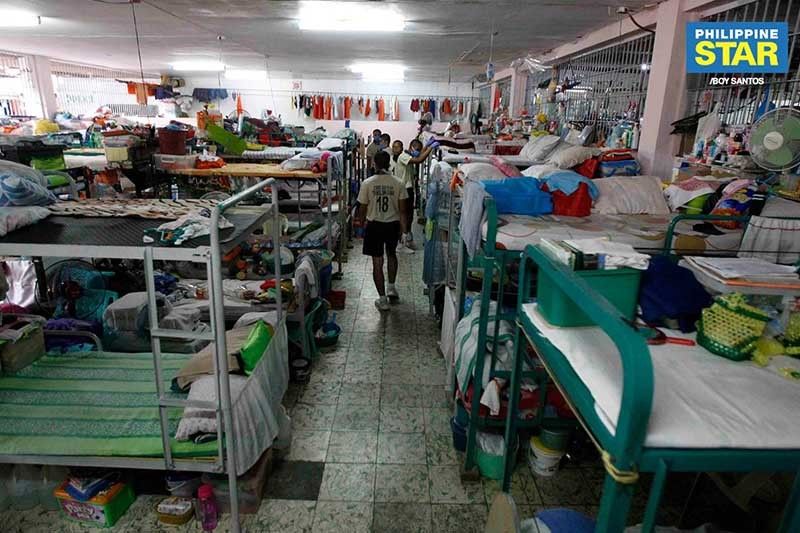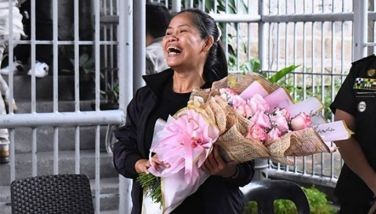Ignored and overlooked: How women’s needs are left unnoticed in Philippine jails

MANILA, Philippines — Jail conditions are harsher on women, a new report on the situation of women in jails revealed.
A booklet titled "Inside Stories: Women’s Situation in Jails and Access to Justice” recently published bared various difficulties faced by women inside detention centers.
Interviews and focus group discussions with women deprived of liberty showed how women are disproportionately affected by already-dire conditions of Philippine jails.
In assessing women’s situation in jail, the study looked at issues of jail congestion, access to justice, availability of basic needs and services and the burden of women’s traditional roles.
“Women are at risk of discrimination in places of detention, which are still predominantly designed for men and managed by men,” the study stated.
The report was produced by the Commission on Human Rights and the United Nations Entity for Gender Equality and the Empowerment of Women. The findings of the study were made available to the public on Monday.
Tight spaces
The lasting impact of the government’s "war on drugs" is felt in the hot, cramped cells of detained women awaiting trial.
Due to relentless arrests, detainees are forced to share cells with more people than the recommended number of detainees per cell.
The study showed that even in the least congested cell, 25 inmates share a space allotted for only 15. Other detainees are not as lucky, with some dormitories having up to 130 individuals sleeping on the floor.
“Nagdadasal na lang kami na hindi na sila manghuli pa kasi magsisiksikan na talaga kami dito,” a participant of the study said.
(We are praying that they will no longer be caught because we will be cramped up in this space)
Lacking resources
With the number of women detainees, basic necessities such as food and water are often subpar if not entirely hard to come by.
“Without additional funding for food despite the influx of inmates, places of detention are budget-constrained and women deprived of liberty are forced to make do with the little food they receive,” the study stated. “Some accounts of dissatisfaction and complaints related to food pertain to low nutritional quality and the absence of food variety.”
In addition to food shortage, some women even report being fed spoiled or undercooked food.
“’Yung kanin minsan may uod tapos ’yung ulam na isda malansa pa. Napaabot na namin ito sa management pero minsan nangyayari pa rin,” a participant shared.
(Sometimes our rice has a worm while we smell the pungent in the fish viand. We have raised this in the management but sometimes the situation is the same)
Access to water is no better. It is even worse for facilities where water supply is intermittent and tap water is unclean or contaminated.
“Most inmates need to purchase their own drinking water, fetch and carry their own water, or rely on family to bring them supplies,” the study added.
Gender-specific needs remain even more scarce with much being highly donor-dependent.
“Women’s specific needs – such as those used for hygiene like toiletries and sanitary napkins – are rarely provided by detention centers,” the study noted. “Only a few detention facilities supply free hygiene kits and toiletries and in most cases, supplies are not regular and are donor dependent.”
Because of this shortage, some inmates resort to stealing from their fellow inmates.
“Mahirap po kapag nagkakawalaan ng gamit [...] Kadalasan kapag walang dalaw ’yung iba, nangunguha sila ng gamit namin. Kinukuha ang sabon, shampoo, minsan po pati panty,” an inmate shared.
(It's hard when our things are stolen. Sometimes, when a prisoner has no visitor, they resort to stealing our things. They are stealing our soap, shampoo, sometimes even our panty.)
The study noted that such situation inside jails are not conducive to vulnerable sectors such as elderly women, women with disabilities and pregnant women.
Exposure to violence
Jails can be a hotbed for violence, as data from the study suggests. However, the study also revealed distrust in reporting mechanisms for abuses inside the facilities.
A number of participants report harsh treatment from jail officials, which includes subjection to abusive language, outdated punishments and mentally intrusive acts.
Discrimination based on one’s Sexual Orientation, Gender Identity, and Expression (SOGIE) also persists inside detention cells, with tasks often distributed according to one’s perceived SOGIE.
The study showed that socially-ascribed roles for women are expected even inside detention cells, with care work often assigned only to women.
Meanwhile, those with diverse SOGIE experience discrimination in terms of automatic task assignments, limitations in spousal visitations and restrained socialization inside jail.
“In several facilities, lesbian, bisexual, and transgender women are segregated from [women deprived of liberty] perceived to be straight or heteronorm-adhering. They are instead roomed with seniors and/or women with disabilities,” the study revealed.
Some find comfort in sharing a space with people with shared experiences. However, some find this segregation unjust and socially-limiting.
Unfulfilled roles
Many of the participants of the study come from low-income backgrounds. With this, many leave behind families lacking a breadwinner or a primary caregiver.
This is a burden women deprived of liberty carry inside their cells.
“In many cases, imprisonment caused the breakdown of their [women deprived of liberty] family units,” the study stated.
As jail populations continue to swell, access to justice becomes even slower and out of reach. Due to different circumstances, many detainees await trial for months, some even years — fueling the fear most inmates share.
“Ayokong dito mamatay, doon ako takot,” a participant said. (I don't want to die here. That's my fear) — intern, Ingrid Alexandrea Delgado
- Latest
- Trending
































